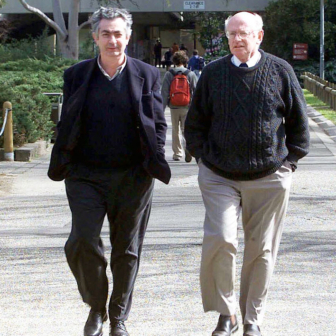Extra Time: Ten Lessons for an Ageing World
By Camilla Cavendish | HarperCollins | $49.99 | 320 pages
The loudspeakers of Japan’s emergency public-address system — designed to warn of tsunamis and earthquakes — are occasionally commandeered to ask the citizenry if they’ve seen an elderly person, looking dazed and confused, wandering the streets.
Japan has a lot of old people and about 16,000 of them go missing every year. Afflicted with dementia, they step out the front door and wander off into a dangerous world. It’s a real and present danger — about 500 of these innocent old people meet with fatal accidents each year.
It’s set to get worse. By mid-century the fastest-growing cohort in Japan’s population will be those aged over eighty. And Japan’s future, to a large extent, is the world’s future.
It seems like only yesterday that Elvis was inventing the teenager. Now there are more sixty-year-olds on Earth than there are kids under five. Women are having fewer babies. Better healthcare means that more of us will die as centenarians.
It’s a global phenomenon. India, China, Russia and even Catholic Italy are on the same inexorable path to senescence. Only the nations of Africa, and the big immigrant countries, such as Australia, Canada and the United States — provided it remains a place where huddling masses are still welcome — will buck the trend to some extent.
The old graph of human ageing was pyramidal; a large number of young people at the bottom supporting a small number of aged at the top. Now it’s swelled at the belly, fattened by the growing numbers of the middle-aged. Soon the graph will swell at the head, and rest daintily on a small platform of youngsters. For the first time in human history, the pyramid will have been turned turtle. Along with AI and climate change, this demographic revolution will become the defining story of humanity in the twenty-first century.
The British journalist and former Downing Street policy wonk Camilla Cavendish was prompted to write Extra Time after observing her parents in old age.
Her father decided he was past it at fifty, descended into depression, divorced Cavendish’s mother, and died in his eighties after living unhappily for another three and a half decades. Post-divorce, her mother borrowed to buy a house, and lived in such terror of defaulting on the mortgage that she lied about her age at work and never joined the firm’s pension fund lest she be identified as an easily expendable old codger.
According to Cavendish “we have created an entirely new stage of life — an extended middle age.” As in sport, in this “extra time” there is everything to play for. But if the lives of her parents are any guide, Cavendish argues, this apparent boon to humanity could easily become a burden.
Extra Time is designed like a self-help book with several easy-to-follow lessons.
There’s the technological fix. Japan, for example, seems obsessed more than other countries with solving its demographic problems using robots. When they’re not being hunted down in the streets for their own good, elderly Japanese are attending exercise classes led by Pepper, a five-foot-tall humanoid robot who will exhort them in a high-pitched giggly voice to bend and stretch.
Where might this trend lead? Back-to-base ankle bracelets strapped to the infirm for “their own good”? ID chips for both the family cocker spaniel and grandma? What about a robot companion that is also a stool pigeon, with all-seeing, all-recording eyes? In a world where citizens happily give away their personal information to billion-dollar companies, why should we expect old age to be the last bastion of privacy?
Then there are the personal fixes. According to Cavendish the people who live longer will — with a bit of effort — be healthier as well. She has christened this rising cohort of humans the Young-Old.
They’ll work longer and pay taxes longer; they’ll keep dementia at bay and, in some cases, get access to anti-ageing drugs. They’ll reinvent community and discover their late-onset ikigai — a Japanese word meaning “purpose in life.” Retirement needn’t feel like a long walk off a short pier, Cavendish advises: just commit to staying useful. There is also a growing body of research that says you’ll live even longer because of it.
Though Cavendish paints an optimistic picture of humanity’s extra time, she tempers it with some realistic fears. “The social contract is being stretched to breaking point,” she writes, “by the changing ratio of old to young, the increasing share of wealth owned by older generations and poor job prospects for the young.”
She warns that the traditional transfer of wealth from the old to the young has actually reversed in some countries, probably for the first time in history — mainly due to rising health costs and the lowering of retirement ages.
George Orwell famously explained that he became a writer because he had “a facility with words and a power of facing unpleasant facts.” Cavendish also has a nice way with words — and anecdotes and characters — but she sometimes fails to face unpleasant facts.
When Cavendish discusses Britain’s need to develop a social-care insurance policy, for example, she comments, correctly in my view, that “what is needed is grown-up cross-party discussion, plus better health services.” But she chooses not to remind us that the austerity policies and Brexit referendum of her old boss, former PM David Cameron — possibly the biggest blunderer in British political history — killed the idea of bipartisanship in Britain for a generation.
She also praises the benefits of the gig economy, particularly to the asset-rich Young-Old, who desire an interesting — and health-enhancing — semi-retirement filled with purpose and exercise. But later in her book she notes how detrimental the gig economy is to the Actual Young, who will struggle to build up enough wealth to cover their old age by working short-term contracts. Maybe the “portfolio career” only works if you inherit a share portfolio as well?
And finally, Cavendish at no point tackles the issue of assisted dying. Not everyone will want extra time, no matter how charming the robots become.
Despite occasional lapses, though, Extra Time is well researched, mainly non-ideological and easily digestible. •




